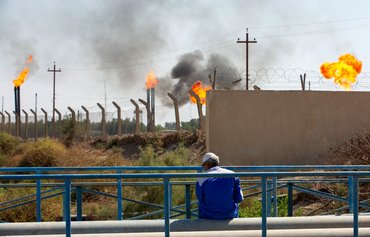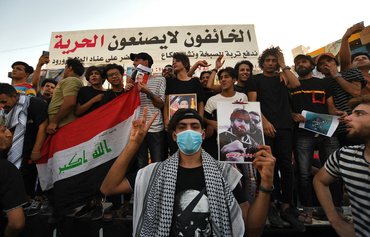Though Basra is rich in oil resources, residents of the southern Iraqi province have long suffered from poor public services and a struggling economy, which they blame to a large degree on Iran-backed militias.
Since the start of October, Basra residents have taken to the streets to protest corruption and the paucity of basic services as part of a wave of protests across Iraq that have left more than 330 people dead.
Iran-backed Iraqi militias have stepped in to suppress the protests, with Basra witnessing some of the worst violence directed against protestors who are angry at Iran’s influence in Iraq and its attempts to divert its resources.
Basra residents who spoke with Diyaruna said they believe the province's oil is being looted by Iran-backed militias, with the proceeds going to fund Iran's Islamic Revolutionary Guard Corps (IRGC).
They said they blame these militias to a large degree for the poor living conditions and crumbling public services they face in the province.
Ghassan, a protestor from Basra, accused Iran-backed Iraqi militias of oppression, arbitrary detention and suppression of freedoms, saying they "only defend Iran's interests and they want to silence us".
The protestors have been calling for an end to the presence of militias "that steal Basra’s oil and hand it over to Iran while the local population is not benefiting at all from their own resources", he said.
"Due to this theft, no real improvement to the state of our public services and our economy has occurred," Ghassan said.
"Instead, we have widespread unemployment, while the militias are becoming wealthier, their influence is increasing and corruption is ballooning," he added.
Militias engaged in smuggling
Basra has practically become the "bread basket" of Iran and its agents, even as most residents of the province live in "abject poverty", without even access to clean drinking water, political analyst Ghanim al-Abed told Diyaruna.
The militias are smuggling "no less than 400,000 barrels of Basra's oil a day via seaports", he said, claiming that most proceeds go to the IRGC and allied regional militias.
Iran-aligned militias claim for themselves a portion of the import tariffs imposed on goods coming into the country through unofficial border crossings with Iran, he added, noting that Basra has become a market for Iranian drugs.
As a result of these actions, "it is only logical for all this public anger to erupt from the residents of Basra", and that this anger would be directed towards the militias and the Iranian regime, al-Abed said.
In September 2018, Basra witnessed a wave of protests during which residents expressed their rejection of the militias and Iranian influence in their province.
"The militias have dealt with the current protests with the same brutality as the ones that occurred last year," he said, by mounting violent campaigns to stamp out the protests per the IRGC's directives.
Iraqi resources being 'plundered'
Public resentment has been brewing because of corruption and the absence of meaningful solutions to the problems that plague the people of Basra and Iraq, said Al-Farabi University College media department head Kadhim al-Muqdadi.
The protests reflect these grievances, which are related to public services, job scarcity and lax enforcement of the law, he told Diyaruna.
People believe their resources are "being plundered right before their eyes and lining the pockets of corrupt individuals and armed factions", he said.
Al-Muqdadi noted the protestors' determination that their demands -- decent living conditions and an end to the hemorrhaging of their national resources -- be met, while criticising the measures taken to deal with the protests.
"It is not in the interest of influential factions linked to Iran for these protests to lead to an end to Iranian influence, which is why they are moving towards stamping them out," he said.
This has occurred in Basra as well as in Karbala province, when protestor tents were burned on November 8th.
Al-Muqdadi stressed that voices demanding reforms should be listened to and that their legitimate requests should be met.

![Iraqi youth take part in a protest in the southern province of Basra. [Diyaruna]](/cnmi_am/images/2019/11/21/21039-iraq-basra-protests-600_384.jpg)






